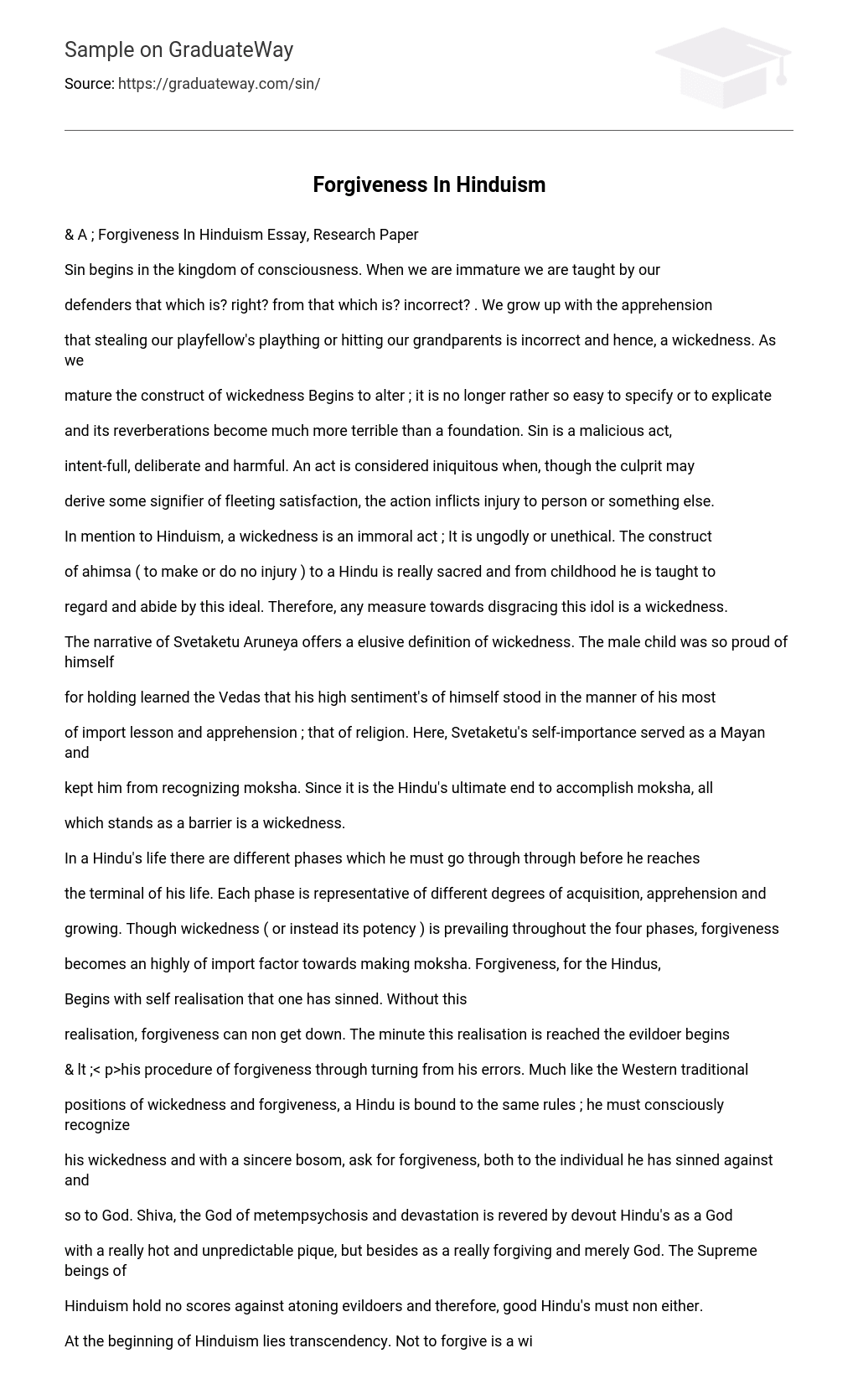& A ; Forgiveness In Hinduism Essay, Research Paper
Sin begins in the kingdom of consciousness. When we are immature we are taught by our
defenders that which is? right? from that which is? incorrect? . We grow up with the apprehension
that stealing our playfellow’s plaything or hitting our grandparents is incorrect and hence, a wickedness. As we
mature the construct of wickedness Begins to alter ; it is no longer rather so easy to specify or to explicate
and its reverberations become much more terrible than a foundation. Sin is a malicious act,
intent-full, deliberate and harmful. An act is considered iniquitous when, though the culprit may
derive some signifier of fleeting satisfaction, the action inflicts injury to person or something else.
In mention to Hinduism, a wickedness is an immoral act ; It is ungodly or unethical. The construct
of ahimsa ( to make or do no injury ) to a Hindu is really sacred and from childhood he is taught to
regard and abide by this ideal. Therefore, any measure towards disgracing this idol is a wickedness.
The narrative of Svetaketu Aruneya offers a elusive definition of wickedness. The male child was so proud of himself
for holding learned the Vedas that his high sentiment’s of himself stood in the manner of his most
of import lesson and apprehension ; that of religion. Here, Svetaketu’s self-importance served as a Mayan and
kept him from recognizing moksha. Since it is the Hindu’s ultimate end to accomplish moksha, all
which stands as a barrier is a wickedness.
In a Hindu’s life there are different phases which he must go through through before he reaches
the terminal of his life. Each phase is representative of different degrees of acquisition, apprehension and
growing. Though wickedness ( or instead its potency ) is prevailing throughout the four phases, forgiveness
becomes an highly of import factor towards making moksha. Forgiveness, for the Hindus,
Begins with self realisation that one has sinned. Without this
realisation, forgiveness can non get down. The minute this realisation is reached the evildoer begins
& lt ;< p>his procedure of forgiveness through turning from his errors. Much like the Western traditional
positions of wickedness and forgiveness, a Hindu is bound to the same rules ; he must consciously recognize
his wickedness and with a sincere bosom, ask for forgiveness, both to the individual he has sinned against and
so to God. Shiva, the God of metempsychosis and devastation is revered by devout Hindu’s as a God
with a really hot and unpredictable pique, but besides as a really forgiving and merely God. The Supreme beings of
Hinduism hold no scores against atoning evildoers and therefore, good Hindu’s must non either.
At the beginning of Hinduism lies transcendency. Not to forgive is a wickedness in itself for it
furthers one from complete release. It is understood that in order to accomplish peace within
oneself, forgiveness is inevitable. Karma, frequently misunderstood or improperly used in the Western
civilization, can outdo be described as the proverbial? to each his ain? . Therefore, it is non for the
independent person to judge whether forgiveness is merited or non. Forgiveness offers alleviation:
alleviation from pending tensenesss, ill-feeling and mounting egoism. Forgiveness saves one signifier
going selfish and narcissistic. Physical exercising, speculation through different signifiers of yoga,
devotedness, religious cleaning through supplication and? public intonation? ( Sharma, 40 ) , all of these
exercisings are performed in order to accomplish a heightened sense of consciousness.
It is through consciousness that one may avoid that which is bad, harmful and evil, both
to oneself and to others. This is the accomplishment of egolessness ( 24 ) . The more 1 learns to
forgive the happier and more peaceable they will experience. The obtention of moksha, can non be
realized through the containment of negative energy which is associated with animus, ill
ideas or malignity. Rather, Hinduism teaches that it is better to forgive, to have
freedom and addition release for oneself, this is fulfillment, this is moksha.





